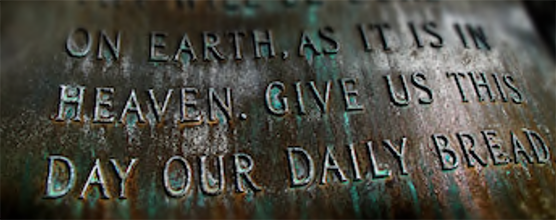
So right after this Jamaican mother taught her twins the Lord’s Prayer, her son queried: “Mom, why ask for daily bread; why not ask for a whole year’s supply?” Before his mother opened her mouth, his sister chimed in: “So that it might be fresh, Giovanni!”
The Lord’s Prayer, which both of us learnt when we were very young (do parents still teach their children this gem?), is no stranger to proposals for change. One of the first such proposals concerns its name: should it still be called ‘the Lord’s Prayer’ or ‘the Disciples’ Prayer’? The Lord’s Prayer, some point out, is found in John 17 not Matthew 6 or Luke 11. One of us believes that the traditional name can stand because the Lord’s Prayer is the prayer given by the Lord to his disciples to pray (at their request, according to Luke!), similar to the Lord’s Supper, the sacrament given to said disciples to partake of.
So what is the Pope’s proposal all about? It is not about the label as discussed above. In fact, the circles in which he moves and in the translation well known to him (the Latin Vulgate), the Prayer is simply known as the Pater noster ( Latin for “Our Father”)—a very good ‘candidate’ for a name change. The Pope’s concern is more substantial. According to the Christian Post (https://www.christianpost.com/news/pope-francis-approves-change-to-the-lords-prayer): “Despite opposition from traditionalists, Pope Francis has officially approved a change to the Lord’s Prayer in Matthew 6:13 that replaces ‘lead us not into temptation’ with ‘do not let us fall into temptation.’ ”
The proposal is not new. A previous pontiff (Pope Benedict XVI), for example, introduces verse 13 with these words: “[t]he way this petition is phrased is shocking for many people: God certainly does not lead us into temptation.” (Jesus of Nazareth (NY: Doubleday, 2007, 160). He then cites texts, like James 1:13 and 1 Corinthians 10:13, to help elucidate his point. Even Prof. Grant Osborne of blessed memory (formerly of Trinity Evangelical Divinity School) in his Magnum Opus on Matthew’s Gospel has a similar rendering to what the present Pope is proposing; translation work is challenging. Here we need to note as well that the other Synoptic Gospels (Mark and Luke) use strong terms (including ‘driven’) to describe the beginning of Jesus’ trials.
Another proposal, this time from a layman, is, ‘Do not leave us into temptation’. Some Bible scholars point to a possible Semitic (Jewish) turn of phrase behind the term for ‘lead’ which . which they say, is employed with permissive force (‘do not allow us . . .’). This comes very close to the intuitive layman rendering above. Probably, then, the objections to the Pope are premature. Hopefully soon somebody will share with the Pope and his detractors the best translation of verse 13 since sliced bread: An no mek wi fies notn we wi kaaz wi fi sin, bot protek wi fram di wikid wan. (JNT; Emphases ours). Interestingly, wikid wan is a translation of poneros in the original—a word which is an ambiguous masculine or neuter. If the latter is intended by the writer, it means (by way of application) hurricane, drought, obeah, bike accident, stray bullet et cetera. If the former the JNT is right on target and the main reference in context is the devil or any person he may choose to manipulate to harm those who have an intimate relationship with Pater noster (our Father). There’s even a story which brings out the point: ‘Pilot to tower, pilot to tower, I am low on fuel and I’m 300 miles away from the airport, what must I do?’ After a seven-second period of silence, a response came: ‘Control to pilot! Control to pilot! Say after me: Our Father …’
The prayer is about our provision and protection. But let us not forget it is preeminently about our Father (Paternoster)–His honour, His kingdom, His will. Its seven petitions begin with these values that are also enshrined in our National Anthem.
Dr. D. Vincent Palmer, Director of Theological Studies, and Rev. Clinton Chisholm, Academic Dean, Caribbean Graduate School of Theology
